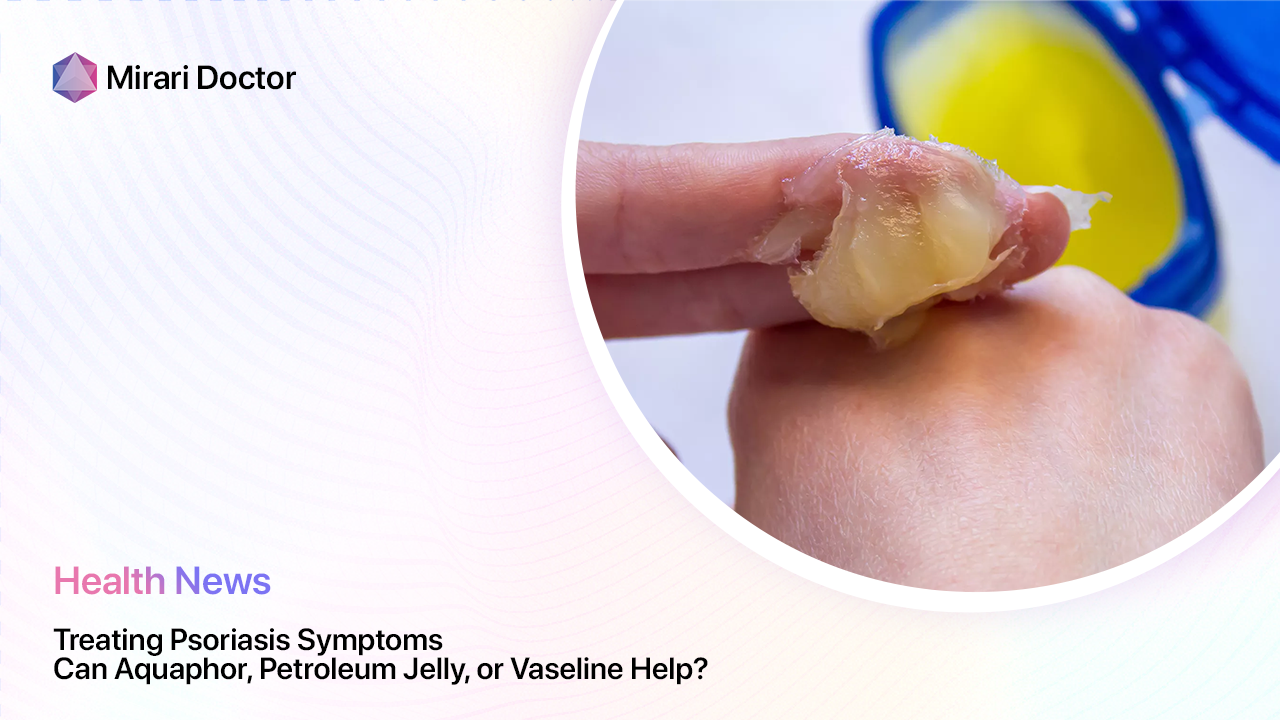
Psoriasis is a chronic autoimmune condition that affects millions of people worldwide. While there is no cure for psoriasis, there are various treatment options available to manage symptoms and improve quality of life. One important aspect of psoriasis management is moisturizing the skin. In this article, we will explore the potential benefits of using Aquaphor, petroleum jelly, or Vaseline to treat psoriasis symptoms. As a trusted source of health information, Mirari Doctor is committed to providing accurate and helpful content to support your well-being.
What is Psoriasis?
Psoriasis is a chronic autoimmune skin condition characterized by the rapid growth of skin cells, resulting in the formation of thick, red, scaly patches on the skin. These patches, known as psoriatic plaques, can appear anywhere on the body but are most commonly found on the scalp, elbows, knees, and lower back. Psoriasis is not contagious and can affect people of all ages, although it most often develops in adults.
Common symptoms of psoriasis include:
- Dry, itchy, and flaky skin
- Red, inflamed patches covered with silvery scales
- Cracked, bleeding skin
- Burning or soreness
- Thickened, pitted, or ridged nails
Psoriasis is often confused with other skin conditions like eczema or dermatitis, but it has distinct characteristics that set it apart. While the exact cause of psoriasis is unknown, it is believed to be triggered by a combination of genetic and environmental factors, such as:
- Stress
- Skin injuries
- Certain medications
- Infections (e.g., strep throat)
- Cold weather
Understanding the triggers and causes of psoriasis can help individuals better manage their symptoms and prevent flare-ups.
The Importance of Moisturizing for Psoriasis
Dry skin is a common issue for people with psoriasis, and it can worsen symptoms like itching, flaking, and inflammation. When the skin becomes dry, it can crack and bleed, increasing the risk of infection and further irritation. Moisturizing is a crucial step in managing psoriasis symptoms and promoting healthier skin.
The benefits of moisturizing psoriatic skin include:
- Reducing dryness and flakiness
- Alleviating itching and discomfort
- Improving skin suppleness and elasticity
- Helping to prevent skin cracking and bleeding
- Enhancing the effectiveness of other psoriasis treatments
Choosing the right moisturizer is essential for people with psoriasis. Look for products that are:
- Fragrance-free
- Hypoallergenic
- Non-irritating
- Occlusive (create a barrier to prevent moisture loss)
What are occlusive moisturizers?
Occlusive moisturizers are a type of moisturizer that creates a physical barrier on the skin’s surface, trapping moisture and preventing further dryness. They are particularly beneficial for people with psoriasis because they help to:
- Soften and hydrate dry, flaky skin
- Reduce water loss from the skin
- Protect the skin from external irritants
According to Dr. Emily Smith, a board-certified dermatologist, “Occlusive moisturizers create a barrier on the skin’s surface, trapping moisture and preventing further dryness. They can be especially helpful for people with psoriasis, as they help to soften and protect the skin.”
Some common occlusive ingredients found in moisturizers include:
- Petrolatum (petroleum jelly)
- Mineral oil
- Dimethicone
- Lanolin
- Beeswax
When selecting an occlusive moisturizer for psoriasis, it’s essential to choose a product that is non-irritating and suitable for sensitive skin. Consulting with a dermatologist can help you find the best moisturizer for your specific needs.
Can Aquaphor Help with Psoriasis?
Aquaphor is a popular over-the-counter moisturizer that has been used to help manage various skin conditions, including psoriasis. It is an occlusive ointment that contains several key ingredients known for their moisturizing and skin-protective properties:
- Petrolatum: Also known as petroleum jelly, this ingredient forms a protective barrier on the skin, locking in moisture and preventing water loss.
- Panthenol: A form of vitamin B5 that helps to hydrate and soothe the skin.
- Glycerin: A humectant that attracts and retains moisture in the skin.
The combination of these ingredients makes Aquaphor an effective moisturizer for people with psoriasis, particularly those with mild to moderate symptoms. By creating a protective barrier and hydrating the skin, Aquaphor can help to:
- Reduce dryness and flakiness associated with psoriasis
- Soothe itching and irritation
- Promote healing of cracked or damaged skin
- Enhance the effectiveness of other psoriasis treatments
While Aquaphor can be beneficial for many people with psoriasis, it’s important to note that it may not be suitable for everyone. Some individuals may find that the ointment feels too greasy or heavy on their skin, while others may experience irritation or allergic reactions. If you have severe psoriasis or are unsure about using Aquaphor, consult with a dermatologist for personalized advice and treatment recommendations.
Using Petroleum Jelly for Psoriasis Relief
Petroleum jelly, also known as petrolatum, is a semi-solid mixture of hydrocarbons derived from petroleum. It has been used for over a century as a moisturizer and skin protectant, and it is a key ingredient in many skincare products, including Aquaphor and Vaseline.
Petroleum jelly offers several benefits for people with psoriasis:
- Locks in moisture: By creating an occlusive barrier on the skin’s surface, petroleum jelly prevents water loss and helps to keep the skin hydrated.
- Protects the skin barrier: Petroleum jelly shields the skin from external irritants and environmental factors that can exacerbate psoriasis symptoms.
- Soothes irritation: The emollient properties of petroleum jelly can help to soothe itching, redness, and inflammation associated with psoriasis.
- Promotes healing: By keeping the skin moisturized and protected, petroleum jelly can help to promote the healing of cracked, damaged, or irritated skin.
To use petroleum jelly for psoriasis relief, apply a thin layer to the affected areas after bathing or showering, while the skin is still damp. This helps to trap moisture and maximize the moisturizing effects. It’s important to choose a high-quality, purified petroleum jelly to minimize the risk of irritation or allergic reactions.
While petroleum jelly can offer relief for many people with psoriasis, it may not be the most effective option for everyone. As Dr. Emily Smith notes, “While petroleum jelly can be helpful, it may not be as effective as some other moisturizers specifically formulated for psoriasis.” If you have severe psoriasis or find that petroleum jelly isn’t providing sufficient relief, consult with a dermatologist to discuss other treatment options.
Is Vaseline a Good Option for Psoriasis?
Vaseline is a well-known brand of petroleum jelly, and like other petroleum jelly products, it can be used to help manage psoriasis symptoms. The benefits of using Vaseline for psoriasis are similar to those of petroleum jelly, as the primary ingredient in both products is petrolatum.
Vaseline can help to:
- Moisturize dry, flaky skin
- Reduce itching and irritation
- Protect the skin barrier
- Promote healing of cracked or damaged skin
To use Vaseline for psoriasis, apply a thin layer to the affected areas after bathing or showering, while the skin is still damp. This helps to seal in moisture and maximize the moisturizing effects.
While Vaseline can be a helpful addition to a psoriasis management routine, it’s important to keep in mind that it may not be suitable for everyone. Some people may find the texture too greasy, while others may experience irritation or allergic reactions. If you have severe psoriasis or are unsure about using Vaseline, consult with a dermatologist for personalized advice and treatment recommendations.
Psoriasis Treatment Options Beyond Moisturizers
While moisturizers like Aquaphor, petroleum jelly, and Vaseline can be helpful in managing psoriasis symptoms, they are often used in conjunction with other treatment options. Some additional psoriasis treatments include:
- Prescription medications: Topical corticosteroids, vitamin D analogs, and topical retinoids, which can help to reduce inflammation and slow down the growth of skin cells.
Light therapy: Exposure to controlled amounts of natural or artificial light can help to improve psoriasis symptoms. This may include ultraviolet B (UVB) phototherapy or psoralen plus ultraviolet A (PUVA) therapy.
Systemic medications: For severe or treatment-resistant psoriasis, oral or injectable medications that target the immune system may be prescribed. These include methotrexate, cyclosporine, and biologics like adalimumab or ustekinumab.
Lifestyle changes: Adopting healthy habits, such as maintaining a balanced diet, exercising regularly, and managing stress, can help to reduce psoriasis flare-ups and improve overall well-being.
It’s essential to work closely with a dermatologist to develop a personalized treatment plan that addresses your specific needs and psoriasis severity. A combination of moisturizers, prescription medications, and lifestyle modifications may be recommended for optimal results.
Living with Psoriasis: Tips and Resources
Living with psoriasis can be challenging, but there are several strategies and resources available to help manage the condition and improve quality of life:
- Manage stress: Stress is a common trigger for psoriasis flare-ups. Engage in stress-reducing activities like meditation, deep breathing exercises, or yoga to help keep stress levels in check.
- Maintain a daily skincare routine: Develop a consistent skincare routine that includes gentle cleansing, moisturizing, and applying prescribed treatments as directed. Avoid harsh soaps or scrubs that can irritate the skin.
- Avoid triggers: Identify and avoid personal triggers, such as certain foods, alcohol, or environmental factors, that may exacerbate psoriasis symptoms.
- Stay connected: Join a psoriasis support group or online community to connect with others who understand the challenges of living with the condition. Sharing experiences and advice can be helpful and empowering.
- Educate yourself: Stay informed about the latest research, treatment options, and management strategies for psoriasis. Reputable organizations like the National Psoriasis Foundation and the American Academy of Dermatology offer valuable resources and educational materials.
Remember, everyone’s experience with psoriasis is unique, and what works for one person may not work for another. Be patient and persistent in finding the management strategies that work best for you, and don’t hesitate to seek support when needed.
When to See a Doctor for Psoriasis
While mild psoriasis can often be managed with over-the-counter products and lifestyle modifications, there are certain situations in which it’s important to consult with a dermatologist:
- Worsening symptoms: If your psoriasis symptoms are not improving or are getting worse despite using over-the-counter treatments, it’s time to see a doctor. They can assess the severity of your condition and recommend more effective treatment options.
- New or unusual symptoms: If you notice any new or unusual symptoms, such as severe itching, pain, or signs of infection, contact your dermatologist promptly. These may indicate a more serious issue that requires medical attention.
- Impact on daily life: If psoriasis is significantly affecting your daily activities, self-esteem, or mental health, don’t hesitate to seek help. A dermatologist can work with you to develop a treatment plan that addresses both the physical and emotional aspects of living with psoriasis.
Remember, early intervention and consistent treatment are key to managing psoriasis effectively. By working closely with a dermatologist and staying proactive about your care, you can minimize symptoms, prevent complications, and maintain a better quality of life.
FAQs
Is psoriasis contagious?
No, psoriasis is not contagious. It is an autoimmune condition that cannot be spread from person to person through physical contact or sharing personal items.
Can I use Aquaphor/petroleum jelly/Vaseline on my scalp psoriasis?
While these products may provide some relief for scalp psoriasis, it’s best to consult with a dermatologist for specific recommendations. They can assess the severity of your scalp psoriasis and advise on the most effective treatment approach, which may include medicated shampoos, topical treatments, or light therapy.
Are there any side effects to using Aquaphor/petroleum jelly/Vaseline for psoriasis?
These products are generally considered safe for most people. However, some individuals may experience skin irritation or allergic reactions. It’s always a good idea to perform a patch test on a small area of skin before applying the product more widely. If you notice any redness, itching, or other signs of irritation, discontinue use and consult with a dermatologist.
What is the best moisturizer for psoriasis?
There is no single “best” moisturizer for psoriasis, as individual needs and preferences can vary. However, in general, look for moisturizers that are fragrance-free, hypoallergenic, and occlusive (meaning they create a barrier to prevent moisture loss). Products containing ingredients like petrolatum, glycerin, or ceramides may be particularly beneficial. Consult with a dermatologist for personalized recommendations based on your specific needs and psoriasis severity.
How often should I moisturize my skin if I have psoriasis?
Aim to moisturize your skin at least twice a day, especially after bathing or showering, when the skin is still slightly damp. This helps to lock in moisture and prevent dryness, which can worsen psoriasis symptoms. If you have particularly dry or flaky skin, you may need to moisturize more frequently throughout the day. Be sure to use gentle, non-irritating products and apply them consistently for the best results.
Key Takeaways
- Psoriasis is a chronic autoimmune skin condition characterized by dry, itchy, red, and scaly patches of skin.
- Moisturizing is a crucial aspect of managing psoriasis symptoms, as it helps to reduce dryness, itching, and inflammation.
- Aquaphor, petroleum jelly, and Vaseline are occlusive moisturizers that can help to soothe and protect psoriatic skin, particularly in mild cases.
- While these products can be beneficial, they may not be suitable for everyone. Consult with a dermatologist for personalized treatment recommendations.
- In addition to moisturizers, psoriasis treatment options may include prescription medications, light therapy, and lifestyle modifications.
- Living with psoriasis can be challenging, but strategies like stress management, maintaining a consistent skincare routine, and seeking support can help improve quality of life.
- If psoriasis symptoms worsen, new or unusual symptoms appear, or the condition significantly impacts daily life, it’s important to consult with a dermatologist for prompt treatment and care.
By understanding the role of moisturizers like Aquaphor, petroleum jelly, and Vaseline in psoriasis management, and working closely with a dermatologist to develop a comprehensive treatment plan, individuals with psoriasis can effectively control symptoms and maintain healthier, more comfortable skin. Visit Mirari Doctor for more expert insights and resources on managing psoriasis and other skin conditions.
Related articles
Made in USA







